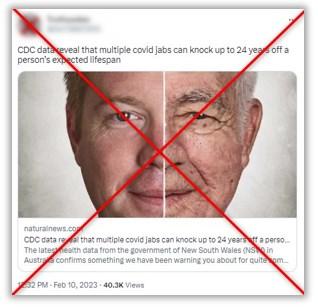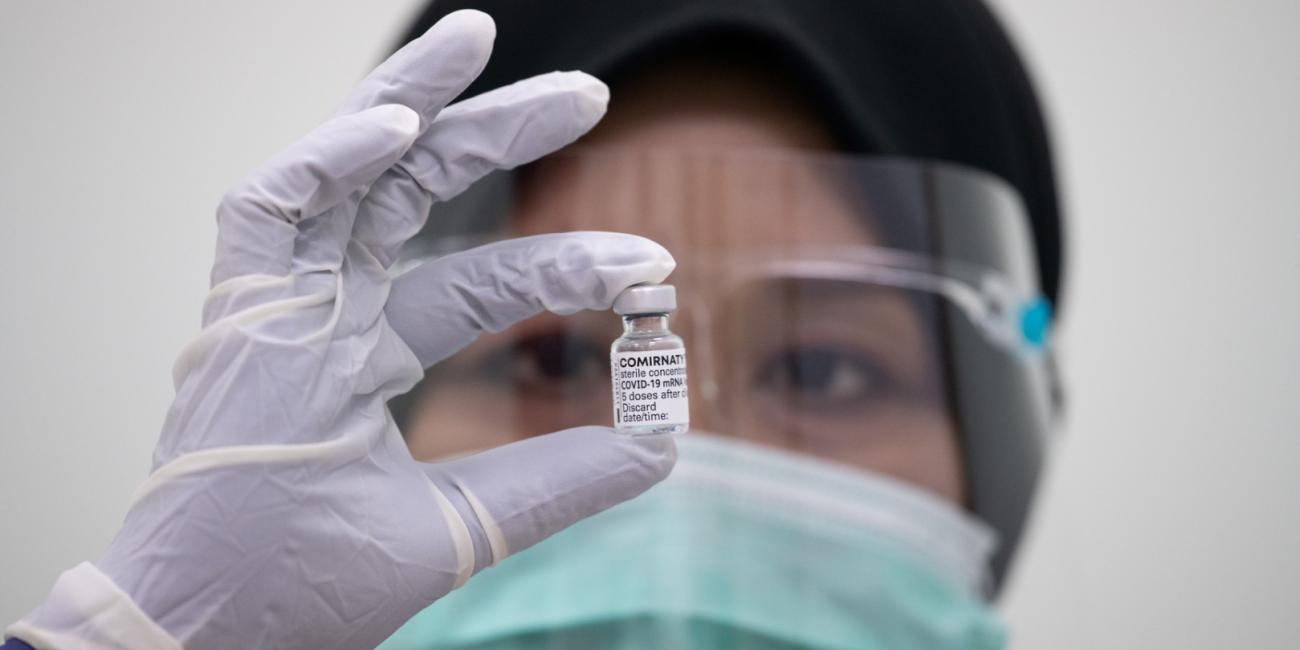
Covid-19 vaccines falsely linked to lower life expectancy
- This article is more than two years old.
- Published on March 16, 2023 at 16:20
- Updated on March 28, 2023 at 18:53
- 4 min read
- By Nahiara S. ALONSO, Natalie WADE, AFP USA
"CDC data reveal that multiple covid jabs can knock up to 24 years off a person’s expected lifespan," says a February 10, 2023 tweet sharing a headline from Natural News, an alternative health website.
AFP has previously fact-checked Natural News for spreading vaccine misinformation. The site's February 9 article claims Covid-19 shots "are a slow-acting genetic poison."

The claim spread elsewhere on Twitter and Facebook, including in Spanish. Many of the posts link to articles from The Expose and News Punch, both of which AFP has fact-checked numerous times.
The articles cite a Cleveland Clinic study titled "Effectiveness of the Coronavirus Disease 2019 (COVID-19) Bivalent Vaccine." The February 23, 2023 pre-print paper found the shot, which includes a component of the omicron variant, provided "modest" protection for the more than 50,000 employees included in the research.
But the study does not analyze life expectancy -- and the supposed CDC data cited in the articles are not available.
"I am not aware of any CDC data suggesting a reduction in life expectancy associated with vaccination against Covid-19 or any other vaccine," said Richard Watanabe, professor of population and public health sciences at the University of Southern California, in a March 9 email.
Amesh Adalja, a senior scholar at the Johns Hopkins University Center for Health Security, said the claims are "completely inaccurate and disconnected from reality."
"While there has been some scientific debate about the immunological imprint that can influence susceptibility to infection, in reality, there has been nothing to show an increase in the rate of deaths in vaccinated people," he said in a March 9 email.
AFP has previously debunked claims that Covid-19 vaccines cause death.
No data for 2022
The articles claim CDC data indicate the overall mortality rate in the US rose by seven percent between 2021 and 2022.
But the agency "has not yet reported mortality data for 2022," said John Grabenstein, director of scientific communications at the Immunization Action Coalition, a nonprofit organization that works to increase vaccination rates.
"All-cause mortality data include drug overdoses, traffic accidents, suicides and many things clearly unrelated to vaccination -- so it is not a specific indicator even if it were available," he said in a March 9 email.
In 2021, US life expectancy did drop from 77 to 76.1 years. That slump, along with a 1.8-year drop the year prior, was "the biggest two-year decline in life expectancy since 1921-1923," according to the CDC.
"The declines in life expectancy since 2019 are largely driven by the pandemic," the agency said in its summary of an August 2022 report. "Covid-19 deaths contributed to nearly three-fourths or 74 percent of the decline from 2019 to 2020 and 50 percent of the decline from 2020 to 2021."
In addition, an estimated 16 percent of the decline between the latter two years was due to "increases in deaths from accidents/unintentional injuries," according to the CDC -- of which drug overdose deaths comprised nearly half.
Claims that Covid-19 vaccines "have caused widespread deaths" are "unsubstantiated," the agency said in a March 20 email. The CDC pointed to a January 2023 study in which it found "no increased risk of death among people who received the Pfizer-BioNTech, Moderna, and J&J/Janssen Covid-19 vaccines."
"Rates of death among people who received Covid-19 vaccines was lower than those of people who did not receive Covid-19 vaccines," the agency told AFP. "This study's findings should reassure potential Covid-19 vaccine recipients and their health care providers that these vaccines are safe."
Study misrepresented
The paper shared online is a preprint, meaning it has not yet been peer-reviewed and published in a scientific journal. Nabin Shrestha, an infectious disease specialist at Cleveland Clinic and the corresponding author, said the study "did not examine hospitalization or death."
"It is incorrect to state that our study found increased risk of hospitalization or death with increasing doses of the vaccine," he said in a March 15 email.
The researchers did find a positive correlation between Covid-19 vaccine doses and infection risk, but Shrestha warned that observation "does not necessarily prove that the vaccine is the cause of this increased risk."
Paul Offit, director of the Center for Vaccine Education at Children's Hospital of Philadelphia, said other important factors include age and pre-existing health conditions.
"In all likelihood, the people who choose more doses are people with a higher risk of disease, not just Covid-19," he said March 9. "They're more at risk because they're older, because they have comorbidities -- they're medically more fragile or more immunocompromised."
Benjamin Neuman, a biology professor at Texas A&M University, said the claims shared online are "twisted to fit an anti-vaccine narrative."
"I don't see evidence that anyone with competence in statistics, biology or physiology was involved in putting this together," he said March 2.
The CDC and the US Food and Drug Administration have identified nine deaths as "causally associated" with Johnson & Johnson's Covid-19 vaccine, which has been linked to a rare blood clotting condition. The CDC recommends Pfizer or Moderna's shots over Johnson & Johnson's.
All of AFP's reporting on vaccine misinformation can be found here.
March 28, 2023 This article was updated with a response from the US Centers for Disease Control and Prevention.
Copyright © AFP 2017-2026. Any commercial use of this content requires a subscription. Click here to find out more.
Is there content that you would like AFP to fact-check? Get in touch.
Contact us




